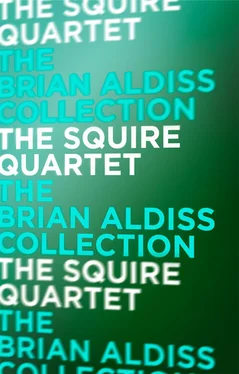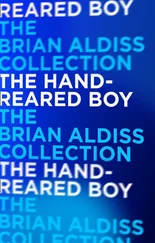The idea – even the irony of it – doesn’t terrify me, as maybe it should. Better fight and die than give in. You defend your own territory. You fight for your own hearth, your own home, your own country. Something the modern generation believes silly. They’ll find out too late when the chips are down. You fight for England. It is atavistic, but the human race hasn’t evolved beyond that yet. If you aren’t prepared to defend, someone else will attack.
Of course, if the You-Foes are real and contain aliens from another planet, the whole course of human history becomes changed. Perhaps that’s why so-called civilized people are reluctant to believe in flying saucers; they are felt to be inappropriate, a discord. The orchestra’s playing Borodin’s Second Symphony; suddenly more musicians enter and start playing Mozart.
If the aliens are hostile … Well, we shall have a situation where Vasili and I will be sharing a slit trench.
I still can’t make him out. Wrote a poem called ‘Winter Celebration’, likening the Soviet system to a medieval feast. Medieval starvation, more like. Exiled by Stalin, then possibly reprieved and disappeared for a while. Disgrace, atonement … Sounds like a typical Ruskie existence. That chap at the consulate, Parker-Smith, thought that Rugorsky might possibly defect. Not here, but in Rome when we’re flying back on Monday. Interesting. If that’s what he intends, he may feel he knows me well enough to flash a warning signal. Perhaps I shall have to help him.
I wonder what Selina’s doing. Will she be dining with me this evening? If not, then perhaps Herman and I can rustle together Cantania, Morabito, the two Frenzas, and even d’Exiteuil, if he’ll speak to me. We’ll have a meal and some drink. Vasili, too. I’d rather talk to him than listen to any Western left-wing nonsense. Actually, I’d rather talk to him than anyone here, except Selina perhaps.
A drink would go down well. Old Herman does go on.
‘Charles Dickens’s novels are among the first to reflect the atomization of modern society brought about by metropolitan life. The faces in his novels are glimpsed vividly – often with nightmare vividness – but briefly, before they disappear. They are known from the outside. SF carries this process further. We see people only in relation to the unknown. The strangers have moved in.
‘Some people praise the logic of science fiction. But I am more interested in the kind of SF which creates mythical beings, robots, monsters, androids, aliens, machines, creatures from the future or the id, revenants, voices from other dimensions, which proliferate in SF as nowhere else. They are a clear indication of the struggle going on within twentieth-century man. In no other form of literature are they so freely allowed on parade.
‘Surely in the future men will see SF as the literature of our time. I am well aware that much of SF is rubbish, like much of ordinary fiction, written for retarded children by superannuated children, but there’s no reason why we should pay attention to that end of the spectrum. As we still listen to the ancient Greek myths, so men of the future will care for ours, which define technological man. We have no reason to doubt that the first tellers of the Greek myths were scorned in palace and court. The new is never welcome. So SF is scorned today in high places.
‘The distinguished founder of the Society for Popular Aesthetics, who is with us in Ermalpa as our guest of honour, has spoken of our task as “exploring the familiar”. That clever phrase describes pretty precisely what SF does. In paradoxical manner, the best stories present Today in a disguise which reveals it nakedly as it is. That is a true imaginative function. Emmanuel Kant has shown how the power of our imaginations, the power of mental picture-making, is essential to us if we are to understand the world. Otherwise, we can’t recognize any object, for objects are only intelligible as members of a class, of classes of vehicles or of whatever you wish. SF helps us to distinguish ourselves as one phenomenon among many, and our planet as one among many, and our lifetime as one among many. It opens the windows of our fancy and can give us a true perspective. For example, it banishes an obsolete socio-economic theory, which has gained some ground here and there, which claims that human beings can profitably be divided into abstractions labelled “bourgeoisie” and “proletariat”.
‘But instead of quoting Kant, for I don’t want to seem nationalistic, I will finish by quoting the English poet, Percy Bysshe Shelley, because he says something in his Defence of Poetry, written at the beginning of last century, which describes with vivid accuracy the plight of today from which a study of science fiction can free us.
‘Shelley says,
We want the creative faculty to imagine that which we know; we want the generous impulse to act that which we imagine; we want the poetry of life: our calculations have outrun conception; we have eaten more than we can digest. The cultivation of those sciences which have enlarged the limits of the empire of man over the external world, has, for want of the poetical faculty, proportionately circumscribed those of the internal world; and man, having enslaved the elements, remains himself a slave.
‘I believe we have to live with that slavery, at least for a while. But SF, I know from experience, is one way of making it tolerable.
‘Thank you for listening to me.’
As Frenza asked for questions or additional statements to be limited to a duration of five minutes, Rugorsky wrote a note and pushed it over to Squire, making it slide across the green baize, one fat finger simultaneously propelling and holding it captive.
The note consisted of four words. ‘But Shelley is dead.’
It was difficult to decide on Rugorsky’s meaning. An idle joke. Or perhaps a positivist Soviet rejection of the poet’s negative remarks. Possibly even a threat of some kind. People did die, and that wasn’t pleasant. As Selina’s Serbian father had died …
Inner vision could fly northwards, away from the Mediterranean, over the Alps and France, across the Channel, across England, to Pippet Hall in the heart of the Norfolk countryside, could enter there undetected and find its way up to the children’s playroom, the old wooden room now painted white which – in the days when it was stained with brown varnish – had been home for Tom, Adrian, and Deirdre.
Striking in through the windows in the room’s brown varnish days, the sun had lit it till it glowed like the interior of a honeypot. Each worn yellow floorboard had an individual character and an individual role. In winter, a coal fire burned in the grate. Next to the grate was a cupboard with a lock mechanism which worked only with difficulty. Inside the cupboard was a secret compartment where Tom stored a few personal possessions. At the back of the compartment was a large tin box with its own lock. The box contained, along with precious things like cigarette cards and postcards and a penknife with bone sides, a fat red notebook on which was printed the one grave word, ‘MEMORANDA’.
To the playroom one day, inpelled by grief, together with a certain sense of dramatic intensity, Tom had gone, removing his red notebook from the recesses of the cupboard, and writing in it in black crayon, ‘March 12th, 1937. Daddy Died.’ From then on, the words being so desperately final, he wrote nothing more in the notebook.
The notebook still existed. So did that entry. So did the death.
John Matthew Squire had bestowed on his eldest son a love of arts and shooting and the countryside which lasted all his life. John Matthew Squire’s death had bestowed on the son who found his body a sense of violence and frustration which equally had never worked itself out of his system.
Читать дальше












